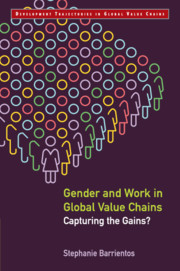Crossref Citations
This Book has been
cited by the following publications. This list is generated based on data provided by Crossref.
Gereffi, Gary
2019.
Global value chains and international development policy: Bringing firms, networks and policy-engaged scholarship back in.
Journal of International Business Policy,
Vol. 2,
Issue. 3,
p.
195.
Bartley, Tim
Soener, Matthew
and
Gershenson, Carl
2019.
Power at a distance: Organizational power across boundaries.
Sociology Compass,
Vol. 13,
Issue. 10,
RANI, Uma
and
GRIMSHAW, Damian
2019.
Introducción. Trabajo, empleo y sociedad: ¿Qué esperar del futuro?.
Revista Internacional del Trabajo,
Vol. 138,
Issue. 4,
p.
619.
Rani, Uma
and
Grimshaw, Damian
2019.
Introduction – Travail, emploi, société: que nous réserve l'avenir?.
Revue internationale du Travail,
Vol. 158,
Issue. 4,
p.
633.
BARRIENTOS, Stephanie
BIANCHI, Lara
and
BERMAN, Cindy
2019.
Gender and governance of global value chains: Promoting the rights of women workers.
International Labour Review,
Vol. 158,
Issue. 4,
p.
729.
RANI, Uma
and
GRIMSHAW, Damian
2019.
Introduction: What does the future promise for work, employment and society?.
International Labour Review,
Vol. 158,
Issue. 4,
p.
577.
BARRIENTOS, Stephanie
BIANCHI, Lara
and
BERMAN, Cindy
2019.
La igualdad de género y la gobernanza de las cadenas de valor mundiales. Promoción de los derechos de las trabajadoras.
Revista Internacional del Trabajo,
Vol. 138,
Issue. 4,
p.
789.
BARRIENTOS, Stephanie
BIANCHI, Lara
and
BERMAN, Cindy
2019.
Égalité entre hommes et femmes et gouvernance des chaînes d'approvisionnement mondiales: promouvoir les droits des travailleuses.
Revue internationale du Travail,
Vol. 158,
Issue. 4,
p.
807.
Lund-Thomsen, Peter
2020.
Corporate social responsibility: A supplier-centered perspective.
Environment and Planning A: Economy and Space,
Vol. 52,
Issue. 8,
p.
1700.
Khan, Mahwish J
Ponte, Stefano
and
Lund-Thomsen, Peter
2020.
The ‘factory manager dilemma’: Purchasing practices and environmental upgrading in apparel global value chains.
Environment and Planning A: Economy and Space,
Vol. 52,
Issue. 4,
p.
766.
Naz, Farah
and
Bögenhold, Deiter
2020.
Understanding labour processes in global production networks: a case study of the football industry in Pakistan.
Globalizations,
Vol. 17,
Issue. 6,
p.
917.
Naz, Farah
and
Bögenhold, Dieter
2020.
Unheard Voices.
p.
123.
Naz, Farah
and
Bögenhold, Dieter
2020.
Unheard Voices.
p.
97.
Naz, Farah
and
Bögenhold, Dieter
2020.
Unheard Voices.
p.
1.
Sproll, Martina
2020.
Ungleichheit in globalen Wertschöpfungsketten: eine intersektionale Perspektive auf soziale Reproduktion.
Österreichische Zeitschrift für Soziologie,
Vol. 45,
Issue. 4,
p.
385.
LeBaron, Genevieve
and
Gore, Ellie
2020.
Gender and Forced Labour: Understanding the Links in Global Cocoa Supply Chains.
The Journal of Development Studies,
Vol. 56,
Issue. 6,
p.
1095.
Naz, Farah
and
Bögenhold, Dieter
2020.
Unheard Voices.
p.
45.
Pananond, Pavida
Gereffi, Gary
and
Pedersen, Torben
2020.
An integrative typology of global strategy and global value chains: The management and organization of cross‐border activities.
Global Strategy Journal,
Vol. 10,
Issue. 3,
p.
421.
Naz, Farah
and
Bögenhold, Dieter
2020.
Unheard Voices.
p.
75.
Naz, Farah
and
Bögenhold, Dieter
2020.
Unheard Voices.
p.
19.





